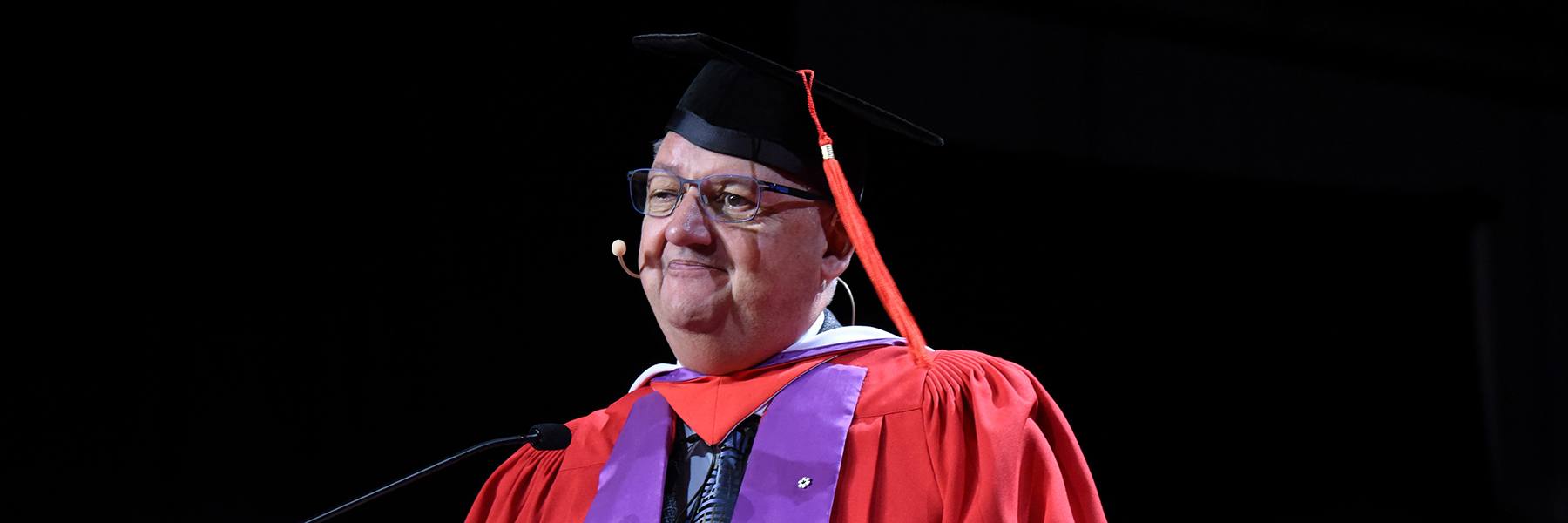
Jeffrey Reading, an award-winning and groundbreaking researcher and advocate in Indigenous public and global health, was presented with an honorary degree from York University during an Oct. 16 convocation ceremony. He urged graduands to seek out and challenge social inequities.
Before speaking to his own academic and professional journey, Reading took a moment to emphasize the impact of education.
“I don't think that we can over emphasize the influence of how education can transform the lives of communities and populations, particularly those who haven't historically had the opportunity to gain education in the way we have this generation,” Reading said.
He praised York for providing that very opportunity to many. “York University exemplifies the privileges and principles of – and in many ways is committed to – equity, diversity and inclusion. In short, York University walks the talk,” he said, citing statistics around how York has enrolled 10,000 international students from 172 different countries, and is home to more first-generation students than any other Ontario university.
Reading continued on to recount his career path – a bachelor of physical education, a master’s in science – and shared how sometimes people's studies, careers and causes can take them to unexpected but meaningful places.

While pursuing a PhD in public health at the University of Toronto, Reading – who is Haudenosaunee from the Tyendinaga First Nations territory – became more engaged in Indigenous health. As he began to read and study health and well-being statistics on Indigenous Peoples, he was taken aback. “I couldn’t believe it,” he recounted to graduands about the significant health inequities he discovered.
“I won't lie, this created some turmoil at the time, both personal and professional,” he said. “There's a great deal of investment, a great deal of time committed, a great deal of hard work that you put into your studies. But I felt that I had to go ahead with that change because I could not be silent on seeing what was happening to my people.”
That change led him to a career that has earned him numerous recognitions – including induction into the Order of Canada – for his work and research reducing Indigenous inequities as Chair of the First Nations Health Authority and as the inaugural scientific director of the Canadian Institutes of Health Research's Institute of Aboriginal Peoples' Health.
He called on graduands to try, as he did, to heed calls to do something when discovering inequities. “Canadians rank among the healthiest people on the planet … and yet, there are profound disparities in this country. There are health crises that we're navigating to this day: the public health emergencies, those declared and undeclared; the opioid crisis; addictions writ large; and racism in the health-care system,” he said. “The world urgently needs your time. It needs you.”
He continued: “The challenge I would pose to you now is to engage communities, civil society, as well as strategic actors and partners in knowledge creation and policy. Please pick a topic that you are passionate about. Please embrace equity, diversity and inclusion. Create welcoming environments that value people and the strength of ideas, as well as embrace a work ethic balanced with fun, passion, commitment … I want you to stand up and be counted. The future is now.“
